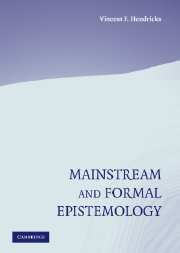1 - Introduction
Published online by Cambridge University Press: 07 December 2009
Summary
It is a curiosity of the philosophical temperament, this passion for radical solutions. Do you feel a little twinge in your epistemology? Absolute skepticism is the thing to try … Apparently the rule is this: if aspirin doesn't work, try cutting of your head.
Jerry Fodor (1985)Humans are in pursuit of knowledge. It plays a significant role in deliberation, decision and action in all walks of everyday and scientific life. The systematic and detailed study of knowledge, its criteria of acquisition and its limits and modes of justification is known as epistemology.
Despite the admirable epistemic aim of acquiring knowledge, humans are cognitively accident-prone and make mistakes perceptually, inferentially, experimentally, theoretically or otherwise. Epistemology is the study of the possibility of knowledge and how prone we are to making mistakes. Error is the starting point of skepticism. Skepticism asks how knowledge is possible given the possibility of error. Skeptics have for centuries cited prima facie possibilities of error as the most substantial arguments against knowledge claims. From this perspective, epistemology may be viewed as a reply to skepticism and skeptical challenges. Skepticism is the bane of epistemology, but apparently also a blessing, according to Santayana (1955): “Skepticism is the chastity of the intellect, and it is shameful to surrender it too soon or to the first comer” (p. 50).
Skepticism is a tough challenge and requires strong countermeasures. In set theory, a powerful combinatorial technique for proving statements consistent with the axioms of set theory was invented by P. Cohen in the 1960s.
- Type
- Chapter
- Information
- Mainstream and Formal Epistemology , pp. 1 - 6Publisher: Cambridge University PressPrint publication year: 2005



